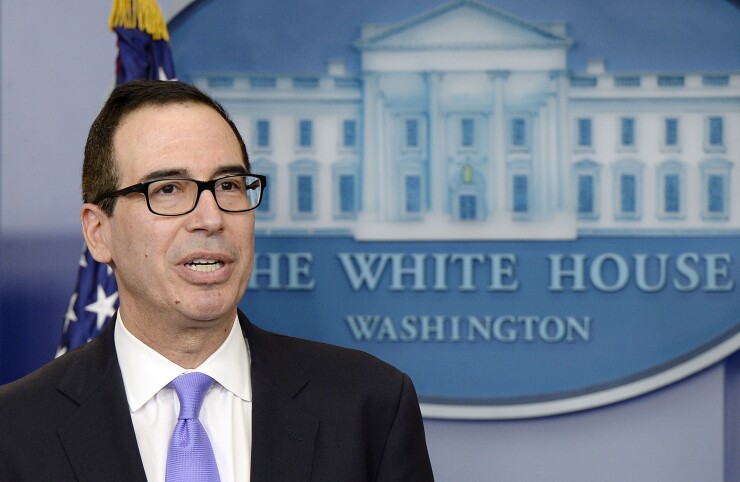WASHINGTON -- The nation's debt limit must be raised by early to mid-October, according to a new estimate issued Thursday by the nonpartisan Congressional Budget Office.
CBO previously issued a vaguer estimate that the Treasury would exhaust its options for avoiding a default sometime in the fall.

Treasury Secretary Steven Mnuchin wants Congress to vote on the debt limit by the end of July, but has said the nation would “be fine’’ if Congress adjourns for a five-week August recess without doing so.
Policy experts cited complications if Congress waits until after Labor Day.
“CBO’s October projection could mean that Congress will be considering the debt limit as the current fiscal year is ending, running up against other budget deadlines,” said Shai Akabas, director of fiscal policy for the Bipartisan Policy Center.
Mnuchin sent a letter to Congress March 16 informing lawmakers that Treasury had begun taking extraordinary measures because the debt ceiling had been reached. March 15 represented the expiration of the suspension of the national debt limit under the Bipartisan Budget Act of 2015.
The March 16 extraordinary actions included a suspension of the sale of State and Local Government Series securities, also known as SLGS. Treasury generally sells between $5 billion and $12 billion of these securities each month, according to the Congressional Budget Office.
SLGS are issued to help state and local governments comply with federal arbitrage laws and regulations when they have money to invest from the issuance of their tax-exempt bonds.
Under a 1998 federal regulation, however, the investable proceeds alternatively can be used to buy federally issued bonds on the open market, as long as any excess cash that’s earned is returned to Uncle Sam. With federal bond rates well below muni rates for several years, the refund requirement hasn’t been a problem, bond attorneys have said.
Treasury also has suspended contributions to the Civil Service Retirement and Disability Fund and the Postal Service Retiree Health Benefits Fund that are not immediately needed to pay beneficiaries. And it has stopped investments in the Government Securities Investment Fund (G Fund) of the Federal Employees' Retirement System.
CBO listed six extraordinary measures Treasury still has available to avoid breaching the debt ceiling, including a continuation of the two steps taken in March.
Among them: suspending the investment of the Thrift Savings Plan’s G Fund which totaled $37 billion at the end of May and suspending investments by the Exchange Stabilization Fund which totaled $22 billion the same date.
Other options include exchanging Federal Financing Bank securities which don’t count against the debt limit for Treasury securities held by the Civil Service Retirement and Disability Fund.
In addition, securities held by the Civil Service Retirement and Disability Fund and the Postal Service Retiree Health Benefits Fund could be redeemed early for the $8 billion in monthly benefits that must be paid in the near future.
Congress will be in recess next week for the Fourth of July observance and then returns for two weeks of work prior to its August hiatus. It then returns to work the day after Labor Day.





